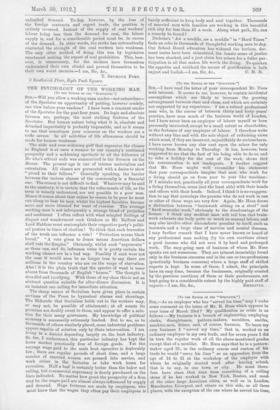[To THE EDITOR OF THE " SPECTATOII.1
have read the letter of your correspondent Mr. Hues with interest. It seems to me, however, to contain incidental assumptions which are likely to increase the growing estrangement between class and class, and which are certainly not supported by my experience. I am a retired professional man who, in the course of between thirty and forty years' practice, have seen much of the business world of London, but I have never been an employer of labour myself or been personally interested, except to a small extent as shareholder, in the fortunes of any employer of labour. I therefore write without any bias and with the sole object of criticising views which must, if they are incorrect, unjustifiably do serious harm. I have never known any slur cast upon the miner for only working from Monday to Thursday. It has, however, been suggested to me that the fact of his being able to do so, and to take a holiday for the rest of the week, shows that his remuneration is not inadequate. I further suggest that Mr. Hues might well reconsider his statement that your correspondents imagine that men who work for a' living should go on from year to year like maehiner. If I mistake not, practically all your correspondents work for a living themselves, some (not the least able) with their hands and others with their beads. Indeed, I think it is no exaggera- tion to say that nowadays the persons who do not work in one or other of these ways are very few. Again, Mr. Hues draws a distinction between "brainwork sitting on a stool" and "hard muscular work," obviously to the disadvantage of the former. I think any medical man will tell him that brain- work exhausts the body quite as much as manual labour, and may also involve other discomforts peculiar to itself, such as insomnia and a large class of nervous and mental diseases. I may further remark that I have never known or heard of any professional man making (by his own exertions alone) a good income who did not earn it by hard and prolonged work. The easy-going men of business of whom Mr. Hues speaks are not numerous. They are (almost invariably) found only in the business concerns and in the one or two professions (practically business concerns) where a large etaff of skilled experts is kept. In some of these, I admit, the principals have an easy time, because the businesses, originally created by the previous exertions of them or their predecessors, are kept going to a considerable extent by the highly paid staff of






































 Previous page
Previous page